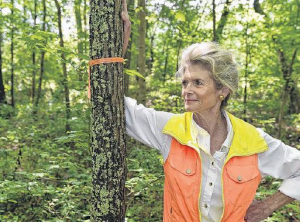
The nation’s oil and gas boom brings cheaper fuel, and real heartache, to thousands of Georgia families who benefit from, or suffer alongside, the thousands of miles of pipelines coursing through the state.
Diane Thomas stands to lose 3.4 acres of tall trees that form an environmentally rich buffer between Godzilla-sized power pylons and her horse farm in Coweta County. One recent morning, after 8 inches of rain, the heavy smell of wet wood and loamy soil proved intoxicating. Tall pines, live oak and sweet gum blocked the sun.
Orange survey ribbons foreshadowed the changes to come.
“My horses enjoy meditating here as much as I do. Sometimes we’ll just stand here and stare,” said Thomas, overlooking a swollen creek. “But we won’t be able to ride this trail once they take down the trees.”
Atlanta Gas Light plans a 17.5-mile pipeline through central Coweta and, Thomas knows, little can be done to stop it. The courts and the Legislature have given Georgia pipeline companies near-carte blanche, via eminent domain, to take private property.
AGL has laid 33,000 miles of pipelines across Georgia. It’s adding nearly 50 miles of pipe in Coweta, Forsyth, northern Gwinnett and Hall counties. The distribution company and an Oklahoma firm are also lining up easements for a 111-mile line from Coweta to Dalton along metro Atlanta’s western flank.
“A lot of areas in Georgia have traditionally been under-served and not had the opportunity to get natural gas,” AGL spokeswoman Kristie Benson said. “We can accommodate areas that are growing by putting pipelines in the ground.”
A Texas builder is tussling with southwest Georgia landowners and local officials over a 157-mile pipeline that would deliver gas to North Florida utilities. Shell Oil and Kinder Morgan, an oil infrastructure company, are petitioning the feds to reverse the flow of a gas pipeline between Atlanta and Savannah so they can export to Europe.
Kinder Morgan also wants to shoot oil, propane and gas down the proposed Palmetto Pipeline from South Carolina through Augusta and Savannah to Jacksonville, Fla. Georgia officials, though, denied a permit last month. An appeal is likely. To succeed, Kinder Morgan will have to show that the pipeline is a “public necessity,” a relatively easy threshold to overcome.
“The public-use doctrine is being twisted and abused by many companies proposing to build these pipelines that are really not for a public purpose, but for a private profit,” said Steve Caley, interim director of Atlanta-based GreenLaw, an environmental nonprofit. “There needs to be a change in the law to further circumscribe the use of eminent domain.”
AGL says its pipelines serve public and a private purposes and are fully sanctioned by the state’s Public Service Commission.
“We go through a very lengthy process. We look at different routes,” Benson said. “We do our due diligence to make sure we’ve selected the best route based on certain criteria.”
Decisions hinge on ‘public necessity’
Diane and husband Alan Thomas quit Sandy Springs for a bucolic corner of Coweta in the late 1980s and transformed 200 acres of timber and bramble into Merichase horse farm. They built a log home, stable, barns, two ponds and riding trails through the woods.
In 1996, the gold-winning German dressage and show-jumping teams trained there before the Summer Olympics. A decade later, the Thomases granted the Georgia Transmission Corp. a 5-acre easement to build a towering power line along the farm’s eastern edge. In return, they received $55,000.
AGL now wants to widen the right of way by permanently taking a 55-foot-wide swath of trees from the Thomases’ farm. A temporary construction easement would gobble an additional 20-foot strip, though the Thomases can replant trees once the line is laid. An independent appraiser suggested $11,000 for the property and the trees. AGL offered $12,000 — an amount the Thomases consider absurdly small.
The pipeline isn’t the only threat to Merichase’s tranquility. Nearly 140,000 people live in Coweta County, a 50 percent surge since 2000. Halfway between Atlanta and LaGrange, Coweta attracts manufacturers and homeowners looking for reasonable prices and proximity to Hartsfield-Jackson International Airport.
I-85 sits within two miles of the horse farm. A 1,000-acre “mega-site,” pitched to Volvo and other carmakers, is even closer.
“The demand is there,” AGL’s Benson said. “And we’ve gone to the Public Service Commission and demonstrated that demand and they authorized (the project). This is for the community, not one specific customer.”
Benson wouldn’t say whether Coweta County, the city of Newnan or the local development authority requested a natural gas pipeline to handle future growth. All that’s needed is for the PSC to agree that a proposed project is a “public necessity.”
“The power companies, railroads or pipeline companies, under Georgia’s system, exclusively decide what is public use,” said Harry Camp, a Cartersville attorney who represents property owners, including the Thomases, in eminent domain cases. “It’s a real uphill battle for Georgia landowners to make a showing that it’s not really in the public interest to have that project.”
AGL gained the PSC’s approval for the Coweta project in 2013. In addition to the expected demand from new customers, AGL’s website states its “obligation to provide enough to serve them on the coldest days of the year.”
This is an excerpt of an article published by The Atlanta Journal Constitution on June 13, 2015. Click here to view the full article →

